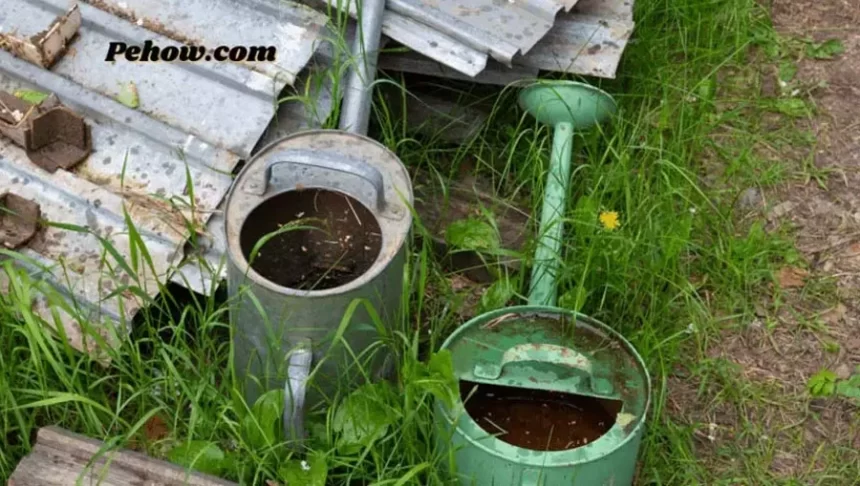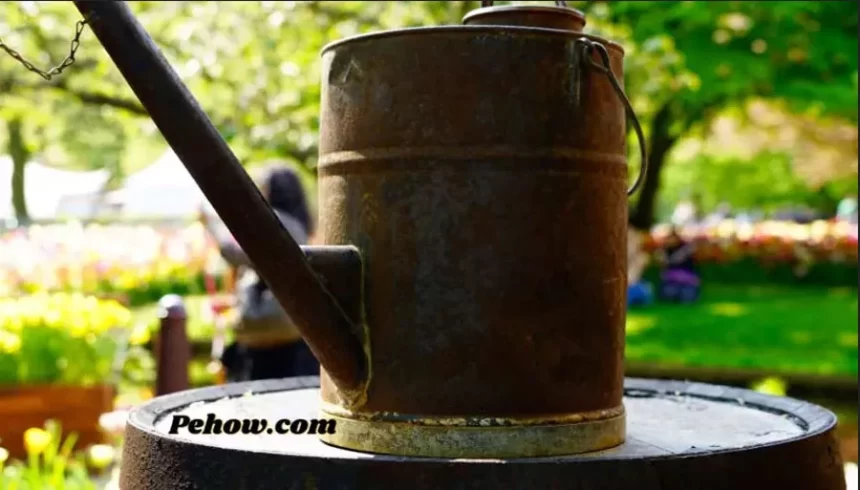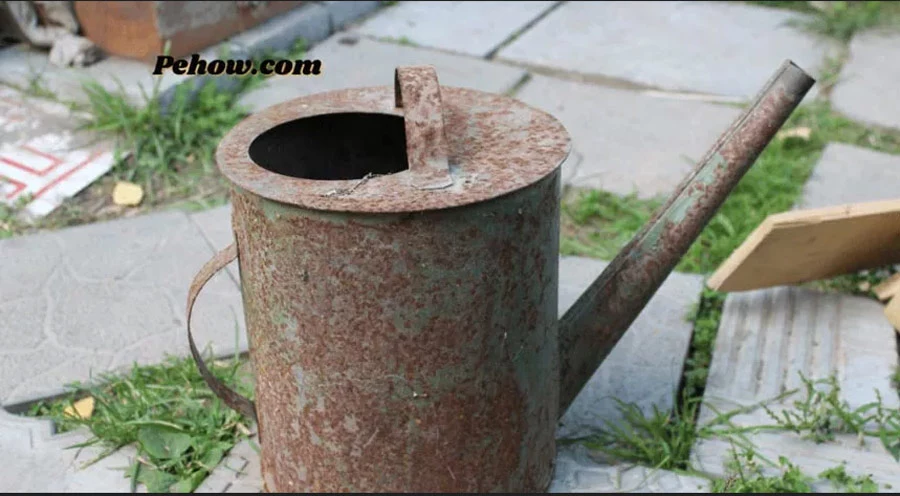Is rusty watering can bad for plants? You may have seen this question asked before and wondered what the answer is. To be honest, I was also worried about the issue myself. After researching the topic, I found that rusty water can is good for plants!
Rust is full of iron, and iron is an essential nutrient for plant growth. While too much iron can be harmful, a little bit of rust in your watering can is actually beneficial for your plants. So next time you see a bit of rust in your can, don’t worry – your plants will love it.
Keep in mind that if your watering can is very rusty, it might be best to replace it. But if it’s just a little rusty, there’s no need to worry. Your plants will be happy and healthy with a bit of rust in their water.
In this article, we will explore why is rusty watering cans bad for plants. We will discuss the benefits of iron for plants and how a little rust can be good for them.
What is rust, and why is it on my watering can
Rust is a type of corrosion caused by the reaction of water and metal. When water is exposed to metal, it creates an electrolytic reaction that causes the metal to break down and form rust.
Rust is not harmful to plants but can cause watering to break down over time. If you notice that your watering can be beginning to rust, you should clean it with a vinegar solution and then dry it thoroughly.
There are a few reasons why rust might be on your watering can. One reason is that the metal is exposed to water and oxygen for an extended period. When this happens, the metal will break down and form rust. Another reason is that the metal might not be properly coated or sealed, allowing water to come in contact with the metal and cause it to rust.
How a little rust can be good for plants
In some cases, a little rust on a watering can be beneficial for plants. Rust is actually composed of beneficial minerals for plants, which can help release those minerals into the soil. So, if you have rusty watering, don’t worry – it does not harm your plants!
There are also many ways rust can be good for plants, including:
1. Rust can help provide essential nutrients to plants.
This is especially important for plants that are growing in nutrient-poor soil. The rust minerals can help add some of those essential nutrients back into the soil, which can help the plants to grow and thrive.
2. Rust can help protect plants from pests and diseases
One of the biggest benefits of rust is that it can help protect plants from pests and diseases. The minerals in rust can help to make the plant less appealing to pests, and it can also help to make the plant more resistant to diseases. So, if you’re having problems with pests or diseases in your garden, adding some rust may help.
3. Rust can help improve the drainage in the soil
If you have compacted soil or poor drainage, the minerals in rust can help improve the drainage. This is because the minerals can help break up the soil and make it easier for water to drain. This can be particularly beneficial during heavy rain when the extra drainage can help prevent flooding.
4. Rust can help to add color to your garden
If you’re looking for a way to add some extra color to your garden, consider using rust. The minerals in rust can help add various colors to plants, depending on the type of rust used. This can be a great way to add some interest and variety to your garden, and it can also be a great way to add some extra nutrients.
Rust can be beneficial for plants in many ways, and it’s something that you should consider if you’re looking for ways to improve your garden. Don’t be alarmed the next time you see a little rust on your watering can – it could be doing more good than you think!
Can I use a rusted watering can?

Rust is not good for all plants. Some plants are okay with a little rust on their watering can, but avoiding using a severely rusted one is best. The rust could clog up the watering can’s spout, making it difficult to water your plants. If you do use a rusted watering can, make sure to clean it out thoroughly before each use.
Plants you can use a rusted watering can for are:
- Beans
- Lettuce
- Turnips
- Spinach
- Kale
- Spinach
- Zucchini
These plants are less likely to be affected by rust. Some gardeners may even say that a little bit of rust can help these plants grow! If you have any other plants that you’re unsure about, it is always best to err on the side of caution and use a different watering can.
Plants you can’t use a rusty watering can for are:
- Tomatoes
- Potatoes
- Peppers
- Eggplants
- Cucumbers
These plants are more likely to be affected by rust. The rust can transfer from the watering can to the plant and eventually kill it. If you’re unsure whether your plant is on this list, it is best to consult a gardening expert before using a rusty watering can.
Can rust help plants?
There is some evidence that rust can help plants. In particular, rusty water is sometimes used to treat fungal diseases in plants. The rust contains compounds that can kill the fungi, and the water helps spread these compounds over the plant’s surface.
However, it is important to note that using rust to treat plant diseases is not a cure-all and can harm plants if the rust is not used properly. For example, too much rust or rusty water that is too hot can damage plants.
Does rust make the soil acidic?
Rust does not make the soil acidic. Rust is a nutrient that is essential for plant growth. Rust is made up of iron and oxygen, two elements that are essential for plant growth. However, too much rust can be harmful to plants.
Excess iron can make soil hard and compact, making it difficult for roots to grow. Too much oxygen can cause leaves to turn yellow and eventually die. If you think your plant is being harmed by rust, you can remove the rust with a wire brush or sandpaper.
What can you do with rusted tin cans?

Most people would say they are trash and must be thrown away. But there are many uses for them if you get creative.
Use rusty tin cans as seedlings for small plants
If you have some rusty tin cans, you can use them as seedlings for small plants. The rust won’t affect the plants, and they’ll be easier to transplant into the ground later. Just punch a few holes in the bottom of the cans for drainage.
Use them as planters
You can also use rusty tin cans as planters. Just clean them out and add some soil and plants. You can leave them as is or paint them to add a pop of color.
Hang them as lanterns
Another use for rusty tin cans is to hang them as lanterns. Add a candle and some string, and you’ve got a rustic decoration for your home.
Make a wind chime
You can also make a wind chime out of rusty tin cans. Just punch a few holes in the sides of the cans, add some string, and you’re good to go.
There are many other uses for rusty tin cans. So next time you come across some, don’t throw them away – get creative and put them to good use.
Can you plant herbs in metal containers?
The short answer is yes, but there are a few things to remember. First, if the container is made of galvanized metal, it can leach zinc into the soil, harming plants. Second, rusty metal may also leach iron into the soil, benefiting plants.
However, if the metal is significantly rusted, it could also leach harmful chemicals into the soil. So if you’re going to use a metal container for planting, it’s best to choose one made of stainless steel or another non-reactive metal.
Will baking soda and vinegar remove rust?
Baking soda and vinegar are common home remedies for rust. It is also a natural way to remove rust from metal. The acid in the vinegar reacts with the baking soda to loosen the rust. This makes it easier to scrub off. You can also use this method to remove rust from tools. Here is how to remove rust with baking soda and vinegar.
Mix together the baking soda and vinegar
Mix baking soda and vinegar together to clean the rust off of the metal. The ratio of baking soda to vinegar is 1:1.
Apply the mixture to the rusted area
Apply the mixture to the rusted area and let it sit for about an hour. This will give the mixture time to work.
Scrub off the rust
After an hour, scrub off the rust with a brush. If the rust is still there, repeat the process.
Rinse off the area
Rinse the area with water to remove any baking soda and vinegar residue.
Dry off the area
Dry off the area with a cloth. You can also use a hairdryer to speed up the process.
The vinegar and baking soda method is a good way to remove rust from small objects. Removing rust is also a safe way since the chemicals are natural. This method is not recommended for large objects because removing the rust will take a long time.
How do you get iron out of the soil?
Iron is an important nutrient for plants and is often found in soil. However, if your soil is high in iron, it can be difficult to get other nutrients out of it.
There are a few ways to get iron out of the soil. One way is to add sulfur to the soil. This will help to decrease the amount of iron in the soil.
Another way to get iron out of the soil is to add organic matter. This will help to increase the number of other nutrients in the soil.
Finally, you can also try to leach iron out of the soil with water. This is usually done by watering the soil heavily and then letting it drain. If you have a lot of iron in your soil, it is best to consult a soil expert to find the best way to get rid of it.
Is it safe to grow herbs in galvanized steel?
If you have an old galvanized steel watering can that you’re thinking of using to water your herbs, you might want to think twice.
While it’s not necessarily bad for plants, there is a chance that rust and metal could leach into the soil and potentially harm your plants. If you’re concerned, using a different watering can or container is best.
Final Thoughts
The listicle is a great way to learn about different ways to use rusty cans. Not only does it provide information on how to remove rust, but it also offers other uses for the can. If you have any old rusty cans lying around, check out this listicle for some inspiration on how to put them to good use.
So, is rusty watering can bad for plants? While it is not necessarily bad for plants, there is a chance that rust and metal could leach into the soil and potentially harm your plants. If you’re concerned, using a different watering can or container is best.
I hope this article was helpful. If you have any questions or comments, please feel free to leave them below. Thanks for reading!



